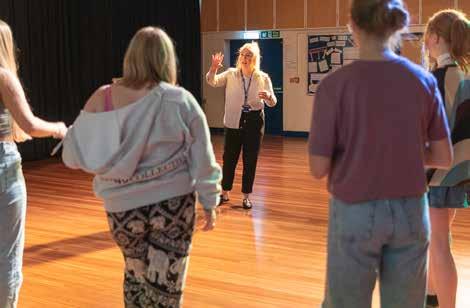
1 minute read
Drama and Theatre
Exam Board: OCR Syllabus: A-level: H459 Consult: Miss E Nichol
(maternity cover)
Advertisement
WHY STUDY THE SUBJECT? The A-level Drama and Theatre course is practical, engaging and allows students to work creatively in a variety of ways. The course encourages students to experiment and take risks with their work while working on developing their own performance style. The course is highly flexible and plays to the strengths of students providing a wide variety of components which aim to ignite and engage students’ creativity, passion and interests, including opportunities to devise their own performances and explore the work of others. The qualifications allow students to study drama and theatre in an academic setting, interrogating this art form and applying their knowledge and understanding.
CONTENT AND BREAKDOWN A-level CONTENT:
Practitioner in Practice (40% of total A-level):
• Explore practically and research two practitioners and an extract from a
performance text • Create a research report, a portfolio of evidence and a devised performance
Exploring and Performing texts (20% of total A-level)
• Study of one whole text • Text performance in front of visiting examiner • Written concept pro forma based on performance
Analysing performance 2 ½ hour written exam (20% of total A-level)
• Explore practically and analyse two performance texts on a chosen theme • Analyse and evaluate a live theatre performance
Deconstructing texts for performance 1¾ hour written exam (20% of total A-level)
• Study, analyse and interpret one set text ASSESSMENT At A-level, there are 2 pieces of coursework (Research Report & Portfolio), 2 performance exams (Devised performance & Scripted performance) and 2 written exams.
EXTRACURRICULAR The course requires students to see one live performance at A-level though additional theatre visits are offered throughout the course.
AFTER ASHCOMBE Students who study A-level Drama often go on to study Drama at university or drama school. Many go on to study Sociology, English, Media, Journalism and other courses.










